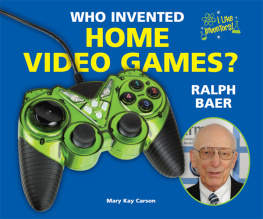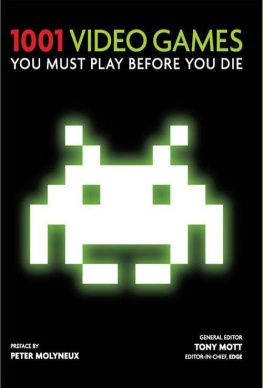Patrick M. Markey - Moral Combat: Why the War on Violent Video Games is Wrong
Here you can read online Patrick M. Markey - Moral Combat: Why the War on Violent Video Games is Wrong full text of the book (entire story) in english for free. Download pdf and epub, get meaning, cover and reviews about this ebook. year: 2017, publisher: BenBella Books, Inc., genre: Religion. Description of the work, (preface) as well as reviews are available. Best literature library LitArk.com created for fans of good reading and offers a wide selection of genres:
Romance novel
Science fiction
Adventure
Detective
Science
History
Home and family
Prose
Art
Politics
Computer
Non-fiction
Religion
Business
Children
Humor
Choose a favorite category and find really read worthwhile books. Enjoy immersion in the world of imagination, feel the emotions of the characters or learn something new for yourself, make an fascinating discovery.
- Book:Moral Combat: Why the War on Violent Video Games is Wrong
- Author:
- Publisher:BenBella Books, Inc.
- Genre:
- Year:2017
- Rating:4 / 5
- Favourites:Add to favourites
- Your mark:
- 80
- 1
- 2
- 3
- 4
- 5
Moral Combat: Why the War on Violent Video Games is Wrong: summary, description and annotation
We offer to read an annotation, description, summary or preface (depends on what the author of the book "Moral Combat: Why the War on Violent Video Games is Wrong" wrote himself). If you haven't found the necessary information about the book — write in the comments, we will try to find it.
Moral Combat: Why the War on Violent Video Games is Wrong — read online for free the complete book (whole text) full work
Below is the text of the book, divided by pages. System saving the place of the last page read, allows you to conveniently read the book "Moral Combat: Why the War on Violent Video Games is Wrong" online for free, without having to search again every time where you left off. Put a bookmark, and you can go to the page where you finished reading at any time.
Font size:
Interval:
Bookmark:
PRAISE FOR MORAL COMBAT
A fact-filled, persuasive, and witty debunking of the cyclical moral panic about video games.
Steven Pinker, professor of psychology at
Harvard University and author of How the Mind
Works and The Better Angels of Our Nature
A groundbreaking and vitally important book. It gets under the hood of how games actually work on our brains, and in the process it tells us more than any number of sensational news articles. This should be required reading for anyone who loves games or who loves someone who loves games... which is to say, everyone.
Greg Toppo, author of The Game Believes in
You: How Digital Play Can Make Our Kids Smarter
What Chris and Patrick have done with Moral Combat is wonderful. Theyve taken the age-old debates of violence, addiction, and time dilation and presented a holistic perspective on the issue so that any lay person can truly understand the issues. As a filmmaker whos spent much of my career working on video gamerelated content, its refreshing to finally see a book about games that gets it right.
Jeremy Snead, founder of Mediajuice Studios
and writer/director of Video Games: The Movie
and Unlocked: The World of Games, Revealed
Rigorous research is the essential foundation of good policies and good advice for parents. Unfortunately, when it comes to hot-button issues such as media violence, logic and rigor are tossed overboard in a frantic paddle toward favored conclusions. The results can be downright crazy. This book, from two highly respected academics, brims with fascinating detail on the history of media panics, the sometimes-shady sausage-making of research, and collisions between agenda-driven scientists, doctors, judges, and politicianswith childrens play as collateral damage. Even readers familiar with video game politics and history will find something to gasp about. And stressed parents may finally understand what their kids get out of those games, and how to manage them better.
Cheryl K. Olson, ScD, coauthor of Grand Theft Childhood:
The Surprising Truth About Violent Video Games and What
Parents Can Do and principal investigator for a major
government-funded study of video games and youth
Apparently Markey and Fergusons enjoying video games didnt distract them from writing a thoroughly entertaining analysis of whether we should be worried about the effects of violent video games. Gamers should buy this book for their parents, and parents should calm down teachers and pediatricians with a copy. Anyone interested in a great, skeptical takedown of bad science should get their own copy.
James C. Coyne, professor emeritus of psychology
and psychiatry at the University of Pennsylvania
Markey and Ferguson shed needed light on a topic too often seen through the lens of our worst fears. This book delivers healthy doses of skepticism and scientific insights that broaden our understanding of 21st-century play. From political horse-trading to weak science, this book is a must-read for anyone interested in video games.
Andrew Przybylski, PhD, experimental psychology
department research fellow at the University of Oxford
Copyright 2017 by Patrick M. Markey, PhD, and Christopher J. Ferguson, PhD
All rights reserved. No part of this book may be used or reproduced in any manner whatsoever without written permission except in the case of brief quotations embodied in critical articles or reviews.

BenBella Books, Inc.
10440 N. Central Expressway
Suite 800
Dallas, TX 75231
www.benbellabooks.com
Send feedback to feedback@benbellabooks.com
First E-Book Edition: March 2017
Library of Congress Cataloging-in-Publication Data is available upon request.
978-1-942952-98-5 (trade paperback)
978-1-942952-99-2 (e-book)
Editing by Alexa Stevenson
Copyediting by Scott Calamar
Proofreading by Michael Fedison and Sarah Vostok
Text design and composition by Aaron Edmiston
Front cover design by Faceout Studios, Derek Thorton
Full cover design by Sarah Dombrowsky
Printed by Lake Book Manufacturing
Distributed by Perseus Distribution
www.perseusdistribution.com
To place orders through Perseus Distribution:
Tel: (800) 343-4499
Fax: (800) 351-5073
E-mail: orderentry@perseusbooks.com
Special discounts for bulk sales (minimum of 25 copies) are available.
Please contact Aida Herrera at aida@benbellabooks.com.
To all the politicians, activists, and scholars who have foisted blame for all manner of social ills on to video games. Without them, this book would not have been possible... or necessary.
PATRICK M. MARKEY AND
CHRISTOPHER J. FERGUSON
CONTENTS
T he tiny beachfront town of Marshfield, Massachusetts, is ideally situated thirty miles outside of Boston on the shore of the Atlantic Ocean. In the summer, its population doubles as out-of-towners flock to the tranquil Victorian homes dotting the coast. Life in Marshfield during the warmer months means getting a tan while fishing and participating in a variety of beach-based activities. As the weather cools and the summer renters depart, the youth of Marshfield can be found cheering for their winning high school football team, hanging out at the local pizza joint, or wandering the small collection of downtown shops. What makes Marshfield unique is not what their citizens do but what they were forbidden to doat least in public. For over three decades in this idyllic town, video games were banned.
In 1982, Marshfields politicians and community leaders decided that outlawing this form of electronic entertainment was the best
Marshfield was hardly unique in its belief in the corrupting influence of video games, especially violent ones. Over the past four decades, American pundits and politicians have blamed violent games for just about every societal ill: school shootings, racism, obesity, narcissism, rickets (a skeletal disease), self-control problems, and drunk driving. Video games have been held responsible for homicides, carjackings, and rapes, for causing limbs to fall off (seriously), for learning disabilities, and even for the terrorist attacks on September 11th. Dozens of laws have been passed, federal hearings have been held, presidents have expressed their concern, and cases have been presented before the US Supreme Court, all in an effort to protect society from this digital menace. The fear surrounding violent video games is so prevalent that it is difficult to remember what it was like before we learned to be afraid of them.
SO IT BEGINS WITH A SMALL DOT AND TWO LINES...
The patrons of Andy Capps Tavern had never seen anything like it. Sure, by 1972 they had heard of computershulking electronic brains used by banks and businessesbut few, if any, had seen a computer game you could play on a thirteen-inch black-and-white television Ping-Pong!
Unbeknownst to those clustered around the machine in Andy Capps Tavern, they were among the first people to play the game. Pong was being test-marketed in this smoke-filled bar by a fledgling company called Atari, and it didnt take Atari long to realize they had struck gold. Eventually, over 35,000 Pong arcade machines would be sold, and millions of families would purchase the home).
Over the next five years, Atari and other companies such as Taito, Sega, and Midway would expand the themes of early video games. Many of these games were variants of Pong, like Ataris Super Pong or Quadrapong, but driving and war games also became popular during this time. Taitos 1974 Speed Race let players drive a digital race car using a steering wheel, and was the first game to feature scrolling graphics. In Ataris
Next pageFont size:
Interval:
Bookmark:
Similar books «Moral Combat: Why the War on Violent Video Games is Wrong»
Look at similar books to Moral Combat: Why the War on Violent Video Games is Wrong. We have selected literature similar in name and meaning in the hope of providing readers with more options to find new, interesting, not yet read works.
Discussion, reviews of the book Moral Combat: Why the War on Violent Video Games is Wrong and just readers' own opinions. Leave your comments, write what you think about the work, its meaning or the main characters. Specify what exactly you liked and what you didn't like, and why you think so.

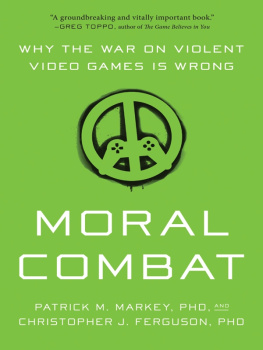
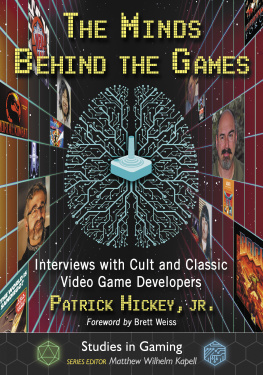
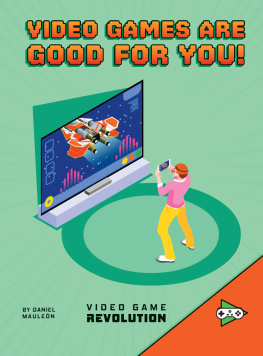

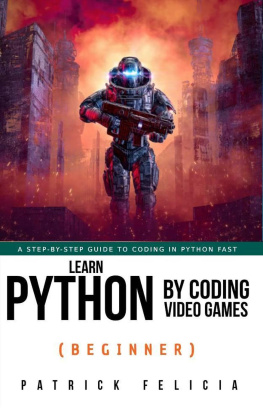
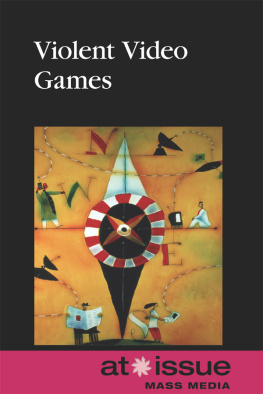

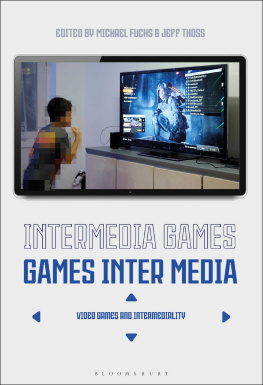
![Mark J. P. Wolf (editor) - Encyclopedia of Video Games: The Culture, Technology, and Art of Gaming [3 volumes]](/uploads/posts/book/279290/thumbs/mark-j-p-wolf-editor-encyclopedia-of-video.jpg)

